Chapter 5: Principle 14: Information and Communication Technology (ICT) and Cybersecurity in BC Planning
Information and Communication Technology (ICT) has become increasingly central to institutions' functioning in the rapidly evolving financial landscape.
Principle 14, "Implement ICT & Cybersecurity Response", underscores the critical importance of robust ICT systems and a strong cybersecurity framework to ensure that operations remain uninterrupted, even in the face of potential threats.
Any lapse in ICT functionality or cybersecurity can devastate financial institutions, where real-time data processing and secure transactions are essential.
The Importance of ICT in Financial Operations
 ICT forms the backbone of modern financial institutions, supporting everything from customer transactions to internal operations and regulatory reporting.
ICT forms the backbone of modern financial institutions, supporting everything from customer transactions to internal operations and regulatory reporting.
Effective business continuity planning in this domain ensures that all ICT systems, including hardware, software, and network infrastructure, are resilient and capable of withstanding disruptions.
This entails regularly assessing ICT systems to identify vulnerabilities, continuously monitoring for potential threats, and developing backup systems that can quickly be deployed in case of failure.
Moreover, financial institutions must also consider integrating ICT with their overall business operations. Ensuring that ICT continuity aligns with the broader business continuity strategy is essential to maintaining seamless operations.
This includes identifying critical ICT services and ensuring adequate redundancy and recovery plans. Employee training on ICT resilience and preparedness for disruptions is vital to ensuring continuity.
Cybersecurity as a Pillar of Resilience
Cybersecurity is a non-negotiable aspect of business continuity in today's interconnected world. Due to the sensitive nature of the data they handle, financial institutions are prime targets for cyberattacks.
 Therefore, cyber resilience becomes a core component of ICT continuity. This involves implementing advanced security measures, such as encryption, multi-factor authentication, and real-time monitoring systems, to detect and prevent cyber threats.
Therefore, cyber resilience becomes a core component of ICT continuity. This involves implementing advanced security measures, such as encryption, multi-factor authentication, and real-time monitoring systems, to detect and prevent cyber threats.
A well-rounded cybersecurity strategy also includes incident response plans closely integrated with the institution's overall business continuity plan. These response plans should outline clear protocols for managing cyber incidents, including containment, eradication, and recovery processes.
Furthermore, regular cybersecurity drills and simulations are essential to prepare the institution for real-world scenarios and ensure that all stakeholders understand their roles in responding to and recovering from cyber incidents.
Building a Resilient ICT and Cybersecurity Framework
Financial institutions should adopt a proactive approach to risk management to build a resilient ICT and cybersecurity framework. This involves continuously updating and testing ICT systems and cybersecurity protocols to adapt to emerging threats. Collaboration with third-party experts and leveraging industry best practices can strengthen the institution's defences.
Additionally, regulatory compliance is crucial in shaping financial institutions' ICT and cybersecurity strategies. Adhering to guidelines and frameworks set forth by governing bodies, such as the Reserve Bank of India, ensures that institutions remain aligned with industry standards while safeguarding their operations.
Summing Up ... The Importance of Proactive Incident Management
In conclusion, Principle 14 highlights the indispensable role of ICT and cybersecurity in business continuity planning for financial institutions.
By prioritizing robust ICT systems and cyber resilience, institutions can safeguard their operations, protect sensitive data, and ensure they continue serving their customers despite disruptions.
| Reserve Bank of India's Guidance Note on ORM and OR Book Series [3] | ||||
| Ensuring Business Continuity: BC Planning and Testing for Financial Institutions | ||||
 |
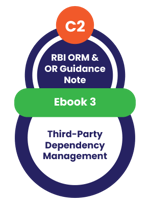 |
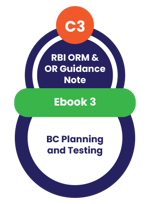 |
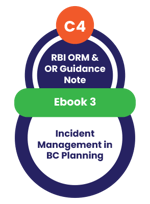 |
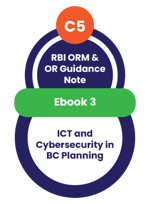 |
 |
 |
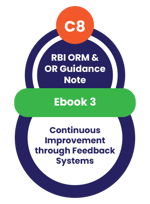 |
 |
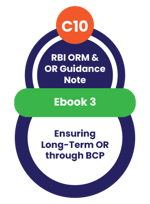 |
More Information About Blended Learning OR-5000 [OR-5] or OR-300 [OR-3]
To learn more about the course and schedule, click the buttons below for the OR-3 Blended Learning OR-300 Operational Resilience Implementer course and the OR-5 Blended Learning OR-5000 Operational Resilience Expert Implementer course.
 |
 |
 |
 |
 |
![[BL-OR] [3-4-5] View Schedule](https://blog.bcm-institute.org/hs-fs/hubfs/hub_generated/resized/e4287b59-1a43-4e10-8e43-c73b27b3ca39.png?width=172&height=50&name=e4287b59-1a43-4e10-8e43-c73b27b3ca39.png) |
![[BL-OR] [3] FAQ OR-300](https://blog.bcm-institute.org/hs-fs/hubfs/hub_generated/resized/294e989f-8613-4bf3-96a5-a89408cfb9ca.png?width=150&height=150&name=294e989f-8613-4bf3-96a5-a89408cfb9ca.png) |
 |
|
|
|
||
 |
 |


![Email to Sales Team [BCM Institute]](https://blog.bcm-institute.org/hs-fs/hubfs/hub_generated/resized/850988ce-aa7d-4953-95cf-797635341edd.png?width=100&height=100&name=850988ce-aa7d-4953-95cf-797635341edd.png)


